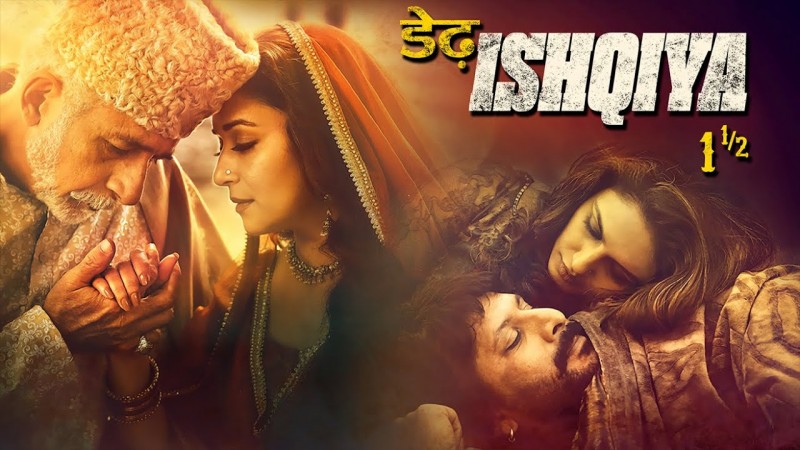
Famous for its captivating shayaris and elegant dialogue, Abhishek Chaubey's 2014 Indian black comedy thriller Dedh Ishqiya is a masterpiece of film. One thing that sticks out is the deep poetry woven throughout the story, even though the movie as a whole garnered positive reviews. A lot of these moving shayaris were, surprisingly, written by renowned poet Bashir Badr, which gave the movie a special depth. The world of Dedh Ishqiya and the genius of Bashir Badr's poetry will be examined in this article.
Renowned Urdu poet Bashir Badr is well-known for his moving and evocative poetry. He was born in Ayodhya, India, on February 15, 1935, and has been a well-known author of modern Urdu literature. His poetry frequently explores the complexities of human emotions, love, and heartbreak. Bashir Badr was the ideal choice for a movie like Dedh Ishqiya because of his profound grasp of human psychology and his skill at communicating it through words.
In Dedh Ishqiya, which is a follow-up to the 2010 film Ishqiya, Naseeruddin Shah's character Khalujan and Arshad Warsi's character Babban get entangled in a web of deceit and love in the made-up town of Mahmudabad. The movie is a masterful fusion of deep comedy, poetic style, and complex narrative. Amidst the captivating story, a multitude of profound shayaris are presented to the audience.
"Mein apni favourite hoon." (My favourite is me.)
It's clear that Bashir Badr had an impact on the film from the very first scene. The tone of the entire movie was established by Begum Para, a character portrayed by Madhuri Dixit, with these straightforward yet profound words. The confident expression, which emphasises self-worth and self-love, is evocative of Bashir Badr.
"Woh aaye ghar mein hamare Khuda ki qudrat hai." (Her entrance into our house is a miracle from God.)
Khalujan's rendition of this shayari masterfully conveys the essence of Begum Para's persona and her influence on the main characters' lives. The character's emotions are given more depth by Bashir Badr's words, which also highlight the divine beauty that she embodies.
"Hamare beech me toh sauda ho gaya, lekin Khuda ke saath humne toh insaaf kar liya." (We came to an agreement, but I had already sworn allegiance to God.)
Bashir Badr skillfully illustrates the characters' difficult moral choices in this shayari. It draws attention to their internal conflict between righteousness and dishonesty, which is a major plot point in the movie.
"Jazbaat ko aksar log zamanat ke bajaye sazaa kehte hain." (Emotions are frequently described as a punishment rather than a commitment.)
Delivered by Huma Qureshi's Muniya, this moving shayari poignantly captures how easy it is for people to see emotions as a burden, despite the fact that they are the foundation of true love and connection.
"Aasman mein ek sitara ho aur aapke paas usse pane ka hak ho." (You have the right to reach for a star when one is visible in the sky.)
The message of Bashir Badr's poetry is that dreams and love are attainable for those who have the courage to go after them. This shayari pays homage to the characters in Dedh Ishqiya who follow their hearts with unwavering determination.
"Ishq ka jo shayari mein matlab dhundta hoon, woh aap se mil nahi sakta." (You do not possess the meaning of love that I seek in poetry.)
Speaking this shayari, Khalujan captures the characters' complex emotions as well as the fact that love is frequently unachievable. The words of Bashir Badr strike a chord with the listener, inspiring feelings of reflection and longing.
Bashir Badr, the distinguished poet, wrote the shayaris for Dedh Ishqiya, which give the movie an amazing depth and emotional quality. The complex relationships between love, deception, and human emotions are explored in his poetry, reflecting the film's multidimensional characters. Bashir Badr's poetry enhances the cinematic experience and makes a lasting impression on the audience when it is skillfully incorporated into the story.
The way that Dedh Ishqiya used the shayaris of Bashir Badr is a tribute to the power of language and the classic beauty of Urdu poetry. It's a film that uplifts the spirit in addition to providing entertainment, and it leaves audiences with a deep respect for the poetic storytelling medium. Within the realm of film, Dedh Ishqiya is regarded as a masterpiece that honours the genius of Bashir Badr's poetry.
This lake is famous by the name of Madhuri Dixit! I will keep looking at the beauty